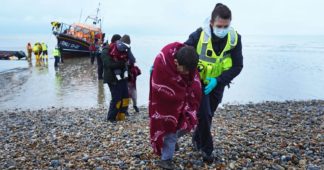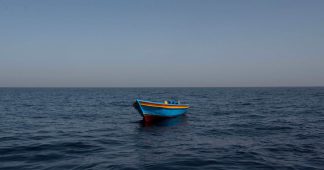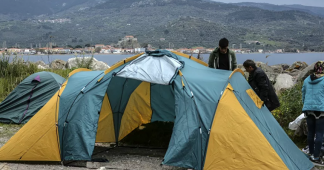The government’s talk of smuggling networks is an attempt to deflect responsibility for the 27 people who died at sea yesterday
By Bethany Rielly
THE growing number of deaths in the Channel are a direct consequence of the British and French governments’ “racist” border fortification policies, refugee rights groups and campaigners said today.
Twenty-seven people, including a pregnant woman and three children, drowned while attempting to reach Britain from northern France yesterday afternoon, in the deadliest Channel crossing since records began.
Following an emergency Cobra meeting called in response to the disaster, Prime Minister Boris Johnson urged France to agree to joint police patrols along the coast to stop small boat crossings.
But groups monitoring crossings in the Channel and Mediterranean warned that further securitisation of the border will only lead to more deaths, and said that the opening of safe routes is the only way to prevent more loss of life.
“These deaths are a direct consequence of the border policies pursued by the UK and French governments,” Jacob Berkson an activist with distress hotline organisation Alarm Phone told the Star.
“Talk by the powerful of smuggling networks is an attempt to deflect responsibility for the deadly consequences of their own racist politics.”
Alarm Phone said that refugees have turned to the deadlier sea crossings due to the securitisation of the Channel tunnel. People are now making longer journeys, launching further along the French coast, and even from Belgium due to increasing checks by French authorities, Alarm Phone said.
This, Mr Berkson said, was the “exact dynamic” seen in the crisis in Morocco.
“When the Moroccan government locked down its Mediterranean border to black Africans, people went south to Western Sahara and now make for the Canary Islands across the Atlantic,” he said.
“The death toll on that route is as high as one in five. It has not reduced the number of people trying to cross.”
Almost 300 asylum-seekers died while trying to cross the Channel to Britain between 1999 and 2020, according to a report released by the Institute for Race Relations last year.
The data, collected by Mael Galisson from Gisti, a legal service for asylum-seekers in France, also indicates that deaths of refugees can rise after further security measures are implemented — in one example, the death toll in the Eurotunnel rose after access to the motorway was made more difficult.
Commenting on Wednesday’s disaster, the Institute of Race Relations said: “Only this week, campaigners referred to the Mediterranean as the ‘liquid graveyard.’
“As our report Deadly Crossings warned last year, the numbers dying in the Channel are steadily escalating, and we fear that the scandal of the Mediterranean is now being replicated in the Channel.
“Military-style solutions don’t solve humanitarian problems. They simply create more profit for the smugglers, and more suffering for those seeking safety.”
Others have drawn parallels between the English Channel and the deadly Mediterranean crossing, in which 230,000 people have gone missing since 2014, according to the Missing Migrants Project.
Kim Heaton-Heather, who works with Mediterranean refugee-rescuer group Sea-Watch and British-based group Channel Rescue, told the Morning Star that he could see the similarities, including in the decreasing quality of boats used in the Channel crossings.
“When I first started getting involved with Channel Rescue … we were really hoping that we wouldn’t see that progress here in the English Channel,” he said.
“[But] what we have seen is an increase in the number of people in the boats in the English Channel and the quality getting worse — some of the ones that we see now almost look half home-made.
“I’ve seen rubber boats collapse in the central Med and I’ve seen huge numbers of people ending up in the water in a matter of seconds, and knowing that’s going on now in the English Channel is something I never dreamed that I would see — incredibly distressing.”
Asked whether the Channel has the potential to become as deadly as the Mediterranean, he said the two weren’t comparable, but added: “When you look at the expanse of the central Mediterranean and when you look at the area of the English Channel, and when you look at the assets available in the central Mediterranean and then you look at assets available in the Channel, to have this death toll already is utterly unbelievable.”
Campaign Against the Arms Trade research coordinator Sam Perlo Freeman called for the “demilitarisation and opening of borders” in response to the disaster.
“This tragedy, like so many others in the Channel and the Mediterranean, is the direct result of the racist policy of framing human beings fleeing war, repression and environmental destruction as a threat to be met by ever more militarised borders,” he added.
War on Want director Asad Rehman said: “These latest deaths alongside the countless others drowning in the Mediterranean, or freezing to death in forests at Europe’s borders demonstrate the utter inhumanity and indifference that stalks the corridors of power.
“No amount of crocodile tears or hand wringing by political leaders can mask their responsibility for fuelling a toxic race to the bottom that undermines the international protection of people seeking safety, forcing desperate people into ever more desperate measures.”
Amnesty International said that failures to open safe routes to Britain were a “critical factor” in Wednesday’s disaster.
The group pointed to immigration figures released today, which show that the numbers of asylum-seekers arriving to Britain have remained stable in recent years while deaths have increased.
Speaking in the Commons, former Labour leader Jeremy Corbyn called on Home Secretary Priti Patel to look at the causes of asylum “instead of concentrating on more frontiers, more barbed wire, more surveillance — not just in this country, but all across Europe.”
It came as protesters geared up for an emergency demo this evening outside the Home Office to demand an end to deaths in the Channel, while vigils were also due to be held in northern France
We remind our readers that publication of articles on our site does not mean that we agree with what is written. Our policy is to publish anything which we consider of interest, so as to assist our readers in forming their opinions. Sometimes we even publish articles with which we totally disagree, since we believe it is important for our readers to be informed on as wide a spectrum of views as possible.











